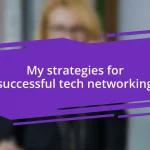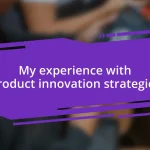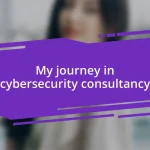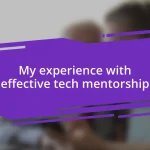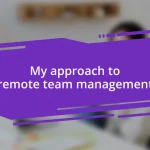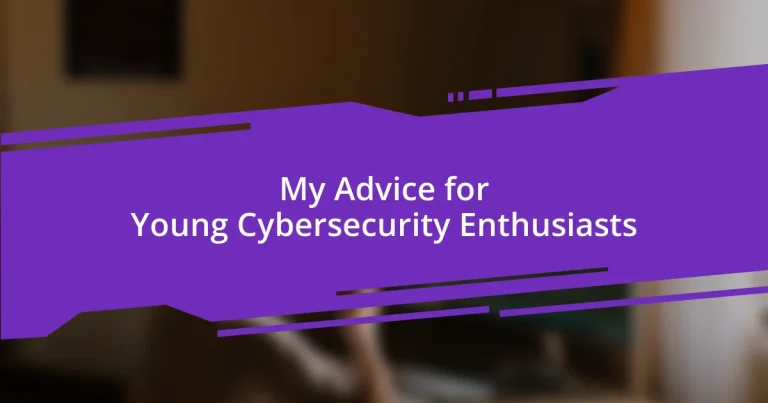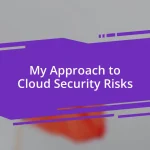Key takeaways:
- Understanding fundamental cybersecurity concepts, such as layers of security and terminology, is crucial for effective communication and overall knowledge in the field.
- Gaining practical experience through hands-on projects, competitions, and community involvement enhances skills and confidence as a cybersecurity professional.
- Building a personal project portfolio and networking with industry professionals are vital for showcasing abilities and discovering career opportunities in cybersecurity.
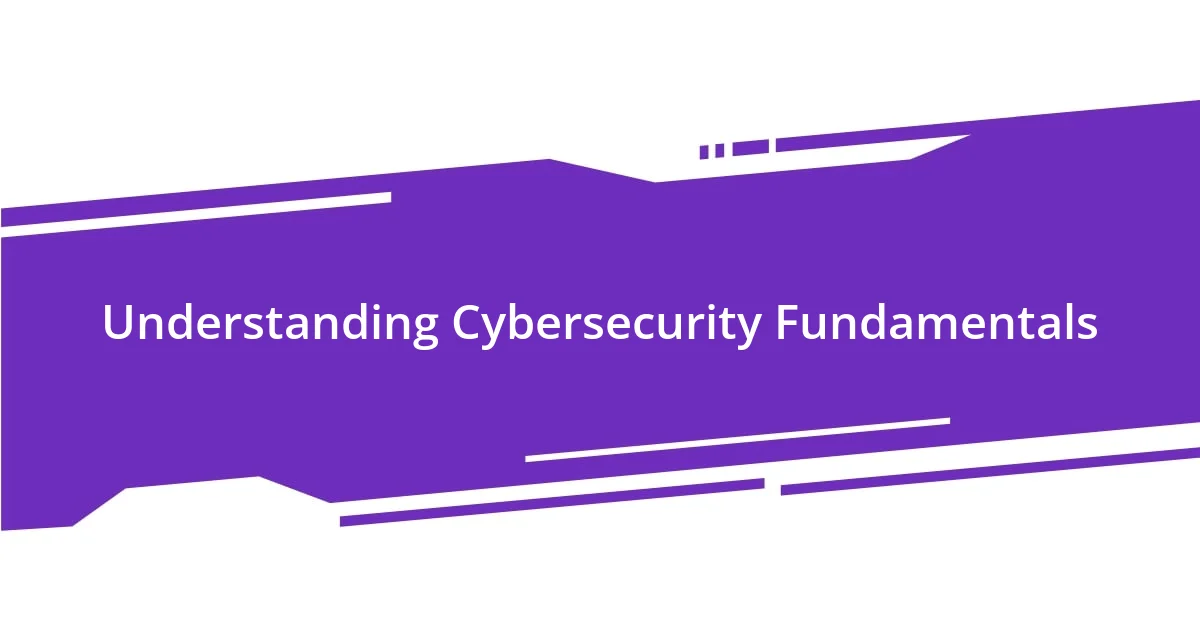
Understanding Cybersecurity Fundamentals
At the heart of cybersecurity lies the understanding of how systems and networks operate. I remember when I first grasped the concept of firewalls and encryption; it felt like unlocking a hidden level in a complex game. Have you ever considered how these technologies protect our data from prying eyes?
One fundamental principle is the idea of layers of security. Just like wearing multiple layers of clothing to keep warm, having several security measures in place drastically reduces the risk of breaches. I’ve seen firsthand how a weak link in a system can lead to devastating consequences, which is why I emphasize the importance of a strategy that combines prevention, detection, and response.
Moreover, grasping the basic terminology is crucial. What does it mean to “phish” for information, or how does malware function? Early on, I often felt overwhelmed by jargon, but I learned that understanding these terms is vital. It’s not just about knowing the words; it’s about being able to communicate effectively with others in the field. Wouldn’t you agree that a solid grasp of these basics can make all the difference as you progress in your cybersecurity journey?
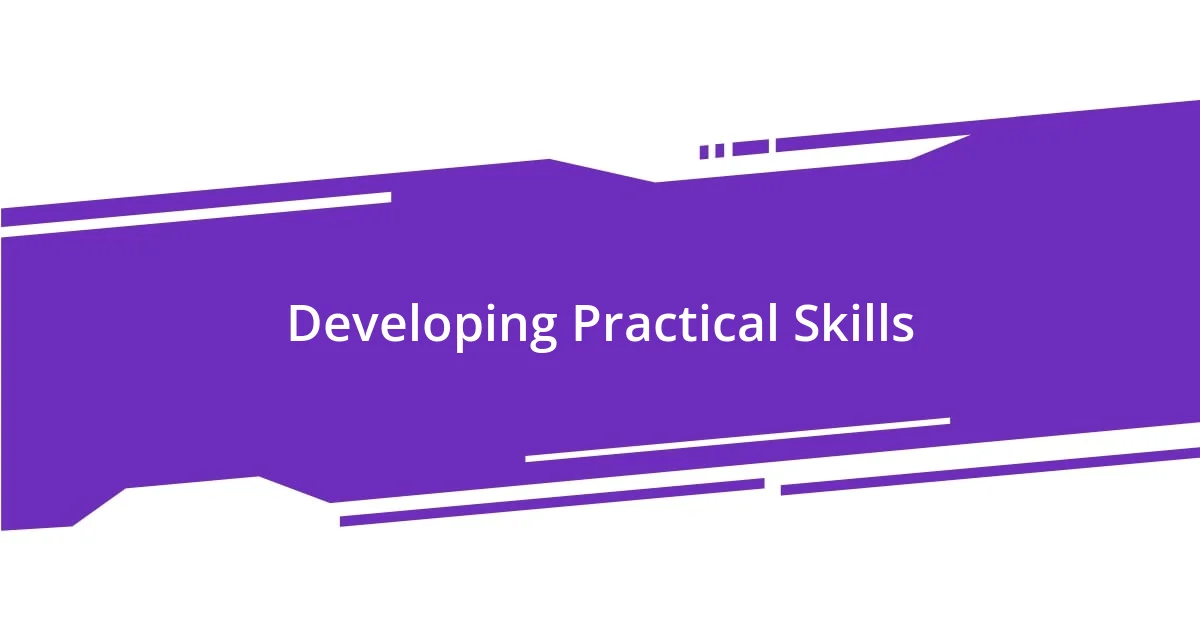
Developing Practical Skills
Developing practical skills in cybersecurity is about hands-on experience. I recall the first time I set up my own lab; the excitement was palpable! I found that experimenting with different tools and techniques not only solidified my knowledge but also sparked my creativity. It’s like taking a cooking class where recipes become more exciting as you start improvising.
To truly thrive in this field, I suggest diving into projects that challenge you. Here are some practical ways to build your skills:
- Participate in Capture the Flag (CTF) competitions: They provide real-world scenarios and puzzles to solve.
- Build your own home lab: Use virtual machines to simulate different environments and attacks.
- Contribute to open-source projects: This expands your skill set while collaborating with others.
- Practice with cybersecurity tools: Get familiar with software like Wireshark, Metasploit, and Kali Linux.
- Join online forums or local meetups: Engaging with the community can offer new perspectives and tips.
Each of these activities can elevate your capabilities and help you gain confidence. Embrace the learning process; it’s as valuable as the destination itself.
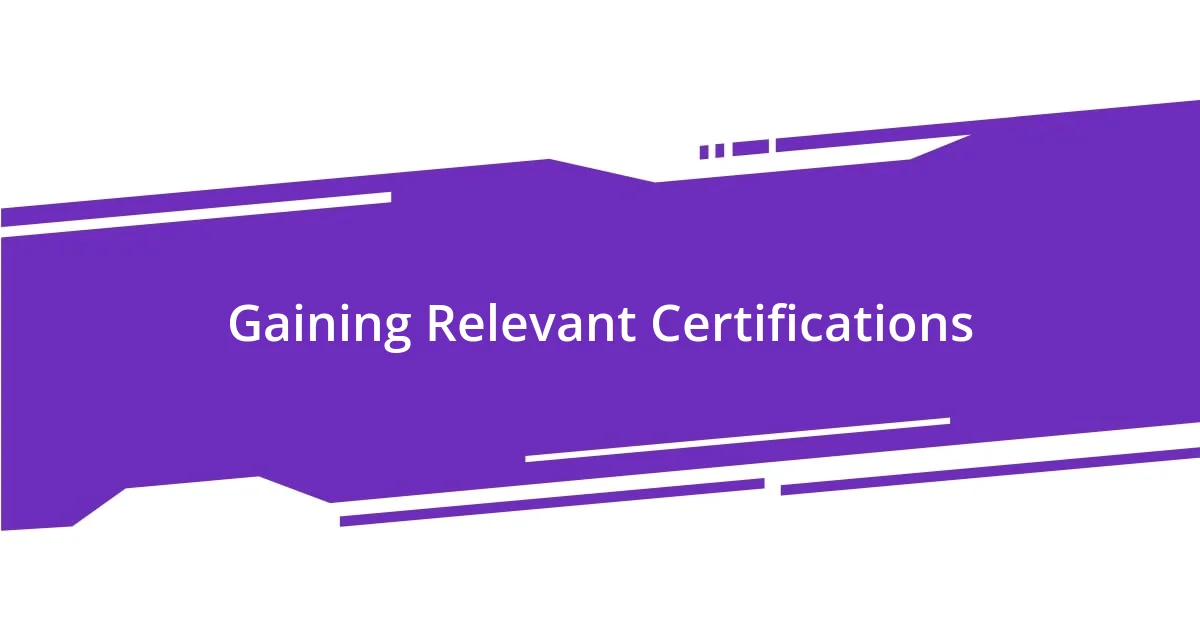
Gaining Relevant Certifications
Gaining relevant certifications is a crucial step for any young cybersecurity enthusiast. When I pursued my CompTIA Security+ certification, I remember the rush of adrenaline while preparing for the exam. It wasn’t just about studying; it was about validating my skills and knowledge in real-world scenarios. Certifications can open doors, especially when starting out. They signal to potential employers that you possess a foundational understanding of key concepts, which can be incredibly reassuring for hiring managers.
One thing I’ve learned is that not all certifications are created equal. Some focus more on theory, while others emphasize practical skills. For example, the Certified Ethical Hacker (CEH) certification really dives into the practical side, while something like the Certified Information Systems Security Professional (CISSP) requires a deeper series of experiences. Each path shapes you differently and can influence your career trajectory significantly. What do you want to specialize in?
To help you navigate this sea of certifications, I’ve put together a simple comparison table. It highlights some key certifications along with their focus areas and required experience.
| Certification | Focus Area | Experience Required |
|---|---|---|
| CompTIA Security+ | Fundamentals of Security | No prior experience |
| Certified Ethical Hacker (CEH) | Penetration Testing | 2 years of IT experience |
| CISSP | Advanced Security Management | 5 years of paid work experience |
Taking the time to research and invest in the right certifications can empower you to build a strong foundation for your future. Trust me; it’s a worthy endeavor.

Networking with Industry Professionals
Networking with industry professionals is a game changer in the cybersecurity field. I vividly remember attending my first cybersecurity conference; I was nervous but excited, and it turned out to be one of the best decisions I made. Engaging with experts and peers opened my eyes to different career paths and opportunities I hadn’t considered before. It’s amazing how a simple conversation can ignite new ideas or lead to unexpected collaborations.
Building genuine relationships is what makes networking work. I often remind myself that it’s not just about exchanging business cards or connecting on LinkedIn; it’s about creating lasting connections. I started reaching out to speakers after their presentations, sharing my thoughts on their topics and asking questions. Those small gestures helped me cultivate friendships with industry veterans, making them more willing to share insights and guidance. How do you think you might initiate those conversations?
Moreover, I’ve discovered that many professionals are happy to help newcomers. I’ve had informal coffee chats that led to unbelievable insights about different career trajectories and skill demands. Don’t hesitate to ask for informational interviews or mentorship; you’d be surprised at how receptive people can be. Remember, every relationship you build not only enhances your knowledge but also creates a supportive community that you can lean on throughout your career.

Identifying Career Opportunities
Identifying career opportunities in cybersecurity goes beyond just browsing job boards; it’s about being proactive. I once stumbled upon a position that seemed perfect, but instead of applying right away, I reached out to someone connected to the company. That conversation not only provided me insight into the company’s culture but also helped me tailor my application to better fit what they were looking for. Have you thought about how a simple inquiry could change your application game?
Another approach that has worked wonders for me is leveraging social media platforms. I often find valuable leads on LinkedIn groups specifically for cybersecurity professionals. By actively participating in discussions and sharing relevant content, I created a solid presence that eventually led to job offers. It makes me wonder: what if you started sharing your journey online? You might be surprised by the connections and opportunities that come your way.
Finally, staying updated with industry trends is essential. I’ve learned that technology is ever-evolving, and so are career paths within cybersecurity. For instance, the rise of cloud security has opened up numerous roles that were virtually unheard of a few years ago. How are you keeping your finger on the pulse of these changes? Embracing lifelong learning can position you at the forefront of emerging opportunities, making room for advancement and specialized roles that truly excite you.

Staying Updated with Trends
Staying updated with trends in cybersecurity is like navigating a constantly shifting landscape; if you’re not paying attention, you might just miss the next big wave. I remember when I first learned about zero-trust architecture, which completely changed my understanding of security frameworks. I started following thought leaders on Twitter and reading their articles to stay ahead. Have you considered how quickly trends can disrupt established norms?
Engaging with online forums and subscribing to industry newsletters has been transformative for me. I recall discovering a critical vulnerability in a popular software suite through a blog post shared by a cybersecurity professional I admire. This not only kept me informed but also sparked my interest in vulnerability management. How many updates do you think you’re catching just by skimming headlines? Every bit of knowledge adds to your overall readiness to tackle future challenges.
Additionally, attending webinars has opened doors to real-time discussions with experts. I once participated in a session about the future of AI in cybersecurity and was amazed by the insights shared. It wasn’t just passive learning; the interactive Q&A made me feel connected to the community, and I even followed up with a speaker afterward for advice. What have you learned from simply listening to others? Embracing a continuous learning mentality ensures you’re equipped with the latest information, empowering you to make informed decisions in your career.

Building a Personal Project Portfolio
Building a personal project portfolio is essential for young cybersecurity enthusiasts, as it showcases your skills and passion. I remember when I launched my first personal project—a basic web application designed to detect phishing attempts. It was a steep learning curve, but the thrill of seeing my code in action was truly exhilarating. How often do we underestimate the power of hands-on experience?
I realized early on that documenting my projects was just as important as the projects themselves. I started using GitHub to share my work, which not only helped me keep track of my progress but also attracted the attention of potential employers. Seeing my contributions build up over time was incredibly rewarding. Have you thought about how your journey could inspire others, too?
Moreover, making my portfolio diverse has paid off significantly. I ventured into various areas, from penetration testing to developing security tools. Each project added a new layer of understanding, making my skill set more appealing. I still recall the excitement of demonstrating my work at a local meet-up, where the feedback fueled my ambitions even further. What projects can you envision that might highlight your unique interests and strengths?
